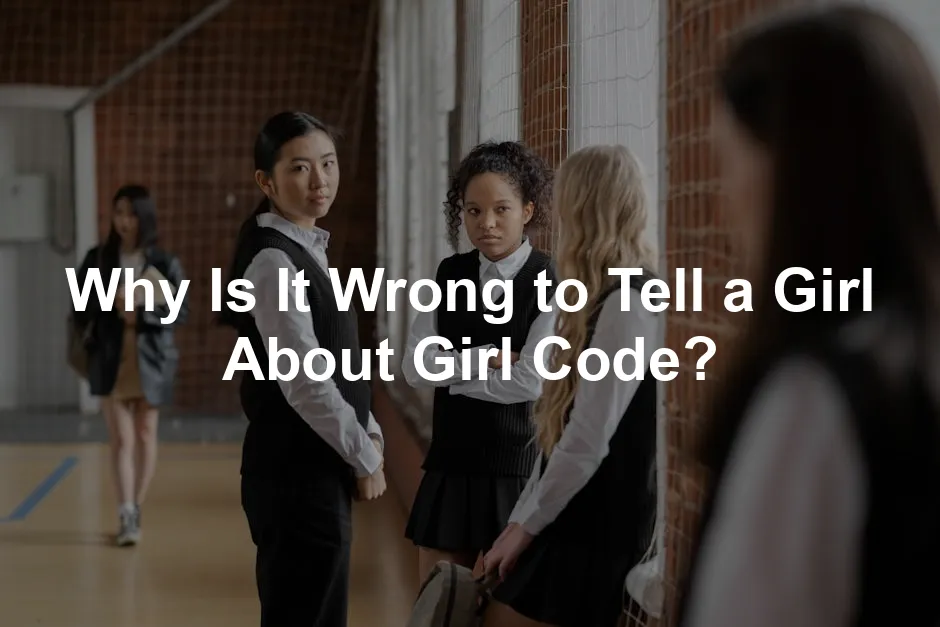
Why Is It Wrong to Tell a Girl About Girl Code?
Introduction
In an age where female empowerment reigns supreme, the concept of “girl code” often casts a long shadow over friendships. This idea, rooted in unspoken rules, aims to foster loyalty among women. While loyalty is admirable, these rules can often stifle individuality and create unnecessary drama. So, is it really fair to uphold these codes at the expense of honest conversations?
Telling a girl about girl code is problematic because it can promote misunderstandings and resentment. Instead of encouraging open dialogue, it enforces a rigid set of expectations that may not align with everyone’s values. For instance, if a girl feels she has to abide by these rules, she might avoid sharing her true feelings, leading to conflicts that could have been easily resolved through communication.
Moreover, the ambiguity of girl code means that interpretations vary widely. What one person sees as a trust violation, another may view as harmless. This lack of consensus often leads to hurt feelings and damaged relationships. As we explore this topic, we’ll examine how enforcing girl code can undermine the very friendships it seeks to protect.
Have you ever wanted to delve deeper into the dynamics of female friendships? Consider picking up “Girl Code: The Book” by Liana Maeby. It’s a humorous yet insightful exploration of the relationships that bind us, and it might just provide the clarity we need regarding these unspoken rules!

The Origins of Girl Code
Girl code, a term many of us know, has roots that stretch back through time. Its evolution reflects societal expectations and the dynamics of female friendships. Historically, women have often been encouraged to bond over shared experiences. This bond sometimes morphed into a code of conduct—unwritten rules designed to protect friendships, especially in the face of male attention.
Initially, girl code aimed to promote solidarity among women, making it a symbol of empowerment. Women were expected to support each other, especially during tough times like breakups or challenges in life. However, this notion quickly evolved. As women became more independent and sought their own paths, the rigid expectations of girl code began to clash with individuality.
Fast forward to modern times, and girl code has been shaped by pop culture. TV shows and movies have romanticized these unwritten rules, leading to a skewed perception of female relationships. Characters in shows like “Sex and the City” and “Gossip Girl” often depict the code as essential, but this portrayal can create unrealistic standards. The drama surrounding these codes can overshadow the genuine support women can offer each other.
Speaking of pop culture, if you’re interested in the complexities of female relationships, check out “The Sisterhood of the Traveling Pants” by Ann Brashares. This delightful story captures the essence of friendship and the bonds that can withstand the test of time.
Moreover, the portrayal of girl code in social media has made it even more complex. Influencers often highlight the importance of loyalty, but the pressure to conform can lead to misunderstandings. As a result, the very essence of girl code has morphed into a source of contention rather than unity.
While the origins of girl code stem from a place of camaraderie, it is essential to recognize how it has changed. Today, many women question whether these unwritten rules serve to uplift or restrict them. The challenge lies in redefining what girl code means in contemporary society—moving from rigid expectations to a more fluid understanding of support and respect among friends.

The Ambiguity of Girl Code
When it comes to girl code, ambiguity reigns supreme. What exactly does it mean? This question can lead to misunderstandings, as girl code lacks clear definitions. Each individual may interpret these unwritten rules differently, often leading to conflicts among friends.
Take, for example, the situation surrounding dating. One woman might think it’s a breach of girl code to date a friend’s ex, while another might see it as fair game after some time. This discrepancy highlights how personal experiences shape our interpretations. For some, girl code is about loyalty, while for others, it represents freedom to pursue happiness, even if it involves someone else’s past.
This lack of consensus can create a minefield in friendships. A breach of girl code might seem like a minor infraction to one person, yet it could feel like a serious betrayal to another. The emotional fallout can be significant, leaving friendships hanging by a thread.
Another layer of complexity arises from societal norms. Many women are raised with the expectation to uphold girl code, often internalizing these rules without questioning their validity. This social conditioning can lead to pressure, with women feeling they must conform to unspoken standards.
For further insights into confidence and self-assurance, consider reading “The Confidence Code: The Science and Art of Self-Assurance” by Katty Kay and Claire Shipman. It offers a powerful exploration of what it means to be confident in today’s world.
Ultimately, the ambiguity surrounding girl code serves as a reminder of the importance of communication. Instead of assuming everyone shares the same understanding, open dialogues can clarify expectations among friends. By addressing these unwritten rules, women can foster healthier relationships built on mutual respect rather than rigid adherence to unclear codes. It’s time to prioritize individual perspectives and promote understanding over ambiguity.

The Burden of Conformity
Social Pressure
Girl code often imposes a heavy burden on women. This unspoken set of rules whispers, “Conform or else!” The pressure to fit into the mold can be suffocating. Women may feel they must suppress their true feelings and desires to maintain friendships. This expectation is like wearing a pair of shoes that are just a bit too tight—uncomfortable and ultimately unsustainable.
When one woman feels obligated to uphold girl code, she risks losing her authenticity. Imagine a friend who secretly likes the same guy as you. Instead of openly discussing it, she might bottle up her feelings. This leads to resentment and frustration. Friendships should inspire creativity, not conformity.
The reality is that not all women share the same values or boundaries. Pressuring someone to adhere to girl code ignores their individuality. This creates an environment where honesty and vulnerability take a backseat. Instead of empowering one another, women can inadvertently create a culture of silence.

Consequences of Suppression
The consequences of suppressing true emotions can be dire. When women hide their feelings, they build a foundation of resentment. For instance, if someone feels they can’t date a friend’s ex, they may harbor bitterness. This bitterness can seep into conversations, turning light-hearted chats into passive-aggressive exchanges.
Over time, this suppression can lead to explosive conflicts. For instance, consider two friends who both liked the same guy. One dates him without consulting the other. The result? A friendship strained to the breaking point. The fallout can be dramatic, leading to hurt feelings and damaged relationships.
When women suppress their feelings, they miss out on genuine connections. Honest conversations can lead to understanding, yet girl code often stifles this potential. Instead of fostering support, it can create hidden agendas and unspoken grudges.
To better understand the importance of personal growth, take a look at “The Gifts of Imperfection” by Brené Brown. It emphasizes the power of vulnerability and authenticity in fostering true connections.
Ultimately, the burden of conformity takes a toll on friendships. Women deserve to express their feelings without fear of backlash. It’s time to prioritize authenticity over adherence to outdated rules. True empowerment lies in embracing individuality and open communication.

Misinterpretations and Conflicts
Dating Dynamics
The complexities of dating often intensify girl code conflicts. Picture this: Two friends, both interested in the same guy. One friend thinks she has dibs. The other sees it differently. This misalignment can lead to chaos. The tension between loyalty and attraction creates tricky waters to navigate.
Dating dynamics can complicate friendships. If the girl code dictates that friends shouldn’t date each other’s exes, what happens when feelings develop? Should one friend forfeit her happiness for another’s past? These dilemmas often lead to misunderstandings.
In many cases, the code is vague and open to interpretation. One person might view a casual relationship as off-limits, while another may think it’s fair game. This ambiguity can foster resentment and distrust among friends. Instead of being allies, women can become adversaries.

Case Studies
Let’s take a stroll down memory lane. Imagine a group of friends at a party. One girl starts chatting with a guy who was briefly involved with another friend. The next day, chaos ensues. The friend feels betrayed, while the other insists it was harmless. This situation illustrates how quickly girl code can lead to disputes.
Another anecdote involves a girl who unknowingly dated her friend’s ex. The fallout? A friendship that crumbled under the weight of girl code expectations. Instead of addressing the situation openly, both parties resorted to hurtful comments. This breakdown highlights the potential damage of misinterpreted rules.
These examples serve as a reminder that girl code can complicate dating and friendships. It’s essential to foster open communication rather than adhere to outdated expectations. Women should feel free to express their feelings without fear of backlash. Ultimately, honesty may be the best policy, ensuring friendships remain intact.

Empowerment vs. Restriction
Feminist Perspectives
Is girl code a feminist ideal or an outdated restriction? This question sparks debate. On one hand, girl code promotes solidarity and loyalty among women. It aims to create a supportive network. However, it can also impose limitations on autonomy. A true feminist perspective values individual choices. When women feel pressured to conform to unwritten rules, it undermines their freedom.
Many women find themselves torn. They want to support their friends but don’t want to sacrifice their desires. This creates a conflict. If girl code truly empowers women, it should foster open dialogue. Instead, it often leads to secrecy and guilt. For instance, consider a scenario where a woman has feelings for her friend’s ex. Should she follow girl code or pursue her happiness?
Moreover, girl code can sometimes feel heteronormative. It often centers around traditional romantic relationships. This perspective excludes diverse experiences among women. Not all friendships fit the mold that girl code suggests. Feminism should celebrate individuality, not restrict it.
To delve into the empowering aspects of womanhood, check out “Lean In: Women, Work, and the Will to Lead” by Sheryl Sandberg. It provides insightful perspectives on navigating workplace and personal challenges as women.
Ultimately, it’s essential to question the validity of girl code. Does it truly reflect feminist ideals? Or does it perpetuate outdated norms? A modern approach to friendship should prioritize understanding and respect over rigid codes.

Balancing Loyalty and Autonomy
Supporting friends is crucial, but it shouldn’t come at a cost to personal autonomy. Balancing loyalty and individuality is a delicate dance. Women often feel they need to choose between being a good friend and staying true to themselves. This dilemma can lead to resentment and conflict.
Imagine a woman who wants to date someone her friend has shown interest in. Following girl code might suggest she should step back. But what if this relationship brings her happiness? Shouldn’t her desires matter too? This tension highlights the struggle many women face.
Boundaries play a vital role in navigating these situations. Open communication allows friends to express their feelings honestly. Instead of adhering to girl code, women can discuss their perspectives. This fosters stronger connections.
A healthy friendship is built on mutual respect and understanding. Friends should feel comfortable expressing their needs without fear of backlash. True loyalty involves supporting one another’s happiness. When women prioritize autonomy, they create a more inclusive environment.
It’s about finding that sweet spot between loyalty and personal freedom. When women empower each other to make their own choices, friendships flourish. This balance not only strengthens relationships but also encourages personal growth.
In conclusion, girl code can be a double-edged sword. While it aims to foster loyalty, it often restricts individual autonomy. The feminist perspective encourages women to question these norms. Supporting friends should not come at the expense of personal happiness. By striving for open communication and understanding, women can create a network that values both loyalty and individuality.

The Need for Open Communication
Encouraging Dialogue
Open communication is the key to successful friendships. Encouraging honest conversations helps prevent misunderstandings. Women often hold back their feelings due to fear of violating girl code. This silence can breed resentment. Instead of talking it out, they suffer in silence.
To foster honest dialogue, friends should create a safe space. This means actively listening to each other without judgment. When one friend feels comfortable expressing her feelings, it opens the door for deeper connections. Imagine a situation where one friend feels hurt but doesn’t speak up. The other friend may remain unaware, leading to unnecessary tension.
It’s crucial to ask questions and share feelings openly. For instance, if a friend is dating someone new, check in regularly. Ask how she feels about the relationship. This not only shows support but also promotes open dialogue.
Honest conversations can also help clarify the ambiguous rules of girl code. When women openly discuss their interpretations, they can find common ground. This prevents conflicts that arise from differing expectations.

Building Stronger Bonds
Strong friendships thrive on effective communication. By discussing feelings and boundaries, women can resolve conflicts before they escalate. This strengthens the bond between friends.
Consider a situation where one friend feels neglected because the other spends time with a new partner. Instead of harboring resentment, they should communicate. Discussing feelings can help both friends understand each other’s perspectives. It allows them to navigate the complexities of relationships together.
Moreover, open communication encourages personal growth. Friends can support each other in making choices that align with their values. When women prioritize honest discussions, they foster an environment of trust. This trust is essential for maintaining healthy friendships.
In a world where girl code often reigns, it’s vital to challenge these unwritten rules. Women should focus on communication rather than conformity. By doing so, they can build strong, supportive relationships that celebrate individuality.
Ultimately, open dialogue is essential for nurturing friendships. It creates a space where women can express their feelings without fear. By prioritizing communication, friends can strengthen their bonds and navigate conflicts with ease. Empowering each other through honest conversations helps create a supportive sisterhood where everyone can thrive.

Conclusion
In conclusion, while girl code may have started as a way to promote loyalty among women, it has become a breeding ground for tension and misunderstanding. These unwritten rules often create rigid expectations that don’t consider individual circumstances. It’s time we shift our focus from these outdated codes to prioritizing open communication and genuine understanding.
Friendships should thrive on honesty, not on a set of ambiguous rules. When women feel pressured to adhere to girl code, they may suppress their true feelings. This suppression can lead to resentment, misunderstandings, and even the breakdown of meaningful relationships. Instead of nurturing bonds, these codes can drive wedges between friends.
Redefining the approach to friendships is essential. We need to embrace individuality and foster honest dialogue. Encouraging open conversations allows for a clearer understanding of one another’s feelings and boundaries. By doing so, we can create an environment that respects personal choices while maintaining strong connections.
Moving forward, let’s champion friendships that celebrate authenticity over conformity. It’s time to cultivate a sisterhood grounded in support, empathy, and the freedom to express ourselves. By breaking free from the constraints of girl code, we can build a community that uplifts and empowers every woman. Together, we can pave the way for a new kind of friendship—one that values communication and mutual respect above all else.

FAQs
What is girl code?
Girl code refers to a set of unwritten rules that govern how women interact with each other, often emphasizing loyalty and support.
Is it okay to break girl code?
Yes, there are circumstances where breaking girl code may be necessary, especially when personal feelings or safety are involved.
How can I communicate better with my friends?
Focus on being honest and empathetic. Encourage open discussions about feelings and boundaries.
What are the consequences of adhering to girl code?
Strict adherence can lead to misunderstandings, resentment, and even the breakdown of friendships.
How can we redefine girl code?
Shift the focus from rules to mutual respect, understanding, and open communication.
Understanding the implications of girl code can help foster more authentic relationships among women. why is it wrong to tell girl about girl code
If you’re curious about the complexities of women’s experiences, you might find “Women Who Run With the Wolves” by Clarissa Pinkola Estés to be a thought-provoking read. It dives into the wild feminine spirit and how it connects with societal norms!
Please let us know what you think about our content by leaving a comment down below!
Thank you for reading till here 🙂
All images from Pexels




